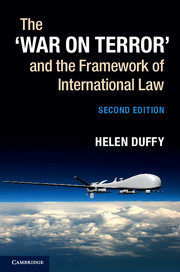Book contents
- Frontmatter
- Dedication
- Contents
- Preface to the second edition
- Preface to first edition
- Select table of cases
- Select table of treaties
- Select Table of resolutions, reports and other sources
- Select list of abbreviations and acronyms
- 1 Introduction
- Part I Terrorism and responsibility
- Part II Responding to terrorism: legal framework and practice
- Part III Case Studies
- 8 Case study I: Guantánamo Bay detentions under international human rights and humanitarian law
- 9 Case study II: Osama bin Laden – ‘justice done’?
- 10 Case study III: extraordinary rendition
- 11 The role of the courts: human rights litigation in the ‘war on terror’*
- 12 Conclusion
- Select bibliography
- Index
- References
8 - Case study I: Guantánamo Bay detentions under international human rights and humanitarian law
Published online by Cambridge University Press: 05 April 2015
- Frontmatter
- Dedication
- Contents
- Preface to the second edition
- Preface to first edition
- Select table of cases
- Select table of treaties
- Select Table of resolutions, reports and other sources
- Select list of abbreviations and acronyms
- 1 Introduction
- Part I Terrorism and responsibility
- Part II Responding to terrorism: legal framework and practice
- Part III Case Studies
- 8 Case study I: Guantánamo Bay detentions under international human rights and humanitarian law
- 9 Case study II: Osama bin Laden – ‘justice done’?
- 10 Case study III: extraordinary rendition
- 11 The role of the courts: human rights litigation in the ‘war on terror’*
- 12 Conclusion
- Select bibliography
- Index
- References
Summary
The degree of civilization in a society can be judged by entering its prisons.
(Fyodor Dostoyevsky)To deny violent extremists one of their most potent recruitment tools, we will close the prison at Guantánamo Bay.
(US National Security Strategy 2010)A defining feature of practice since 2001 has been the large-scale detention of persons ‘for reasons related to the conflict’ that the US purports to be waging against al Qaeda and associated groups. While people have been detained in many centres across the world, by the US or by proxy, a major repository for detainees, and symbol of the ‘war on terror’, has been the United States Naval Base in Guantánamo Bay, Cuba. Since early January 2002, an estimated total of nearly 800 people, including nationals of at least forty states, have at some point been transferred to and held in detention facilities at Guantánamo.
The location of the detention centre on Guantánamo Bay, which the United States authorities claimed was beyond US sovereign territory, was an acknowledged attempt to circumvent the application of human rights protections in the United States Constitution and access to US courts. The detainees were labelled ‘enemy combatants’, in support of the view that normal criminal and human rights law did not apply, though the epithet was simultaneously relied upon to justify the non-application of the protective aspects of international humanitarian law. They came to be held in what has correspondingly been described as a ‘legal black hole’ or ‘legal limbo’.
- Type
- Chapter
- Information
- The ‘War on Terror' and the Framework of International Law , pp. 665 - 746Publisher: Cambridge University PressPrint publication year: 2015

